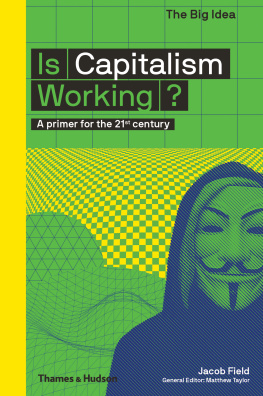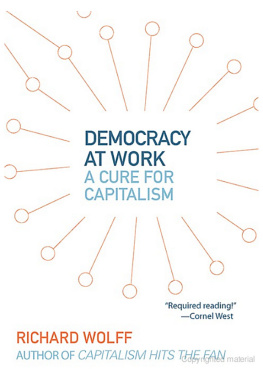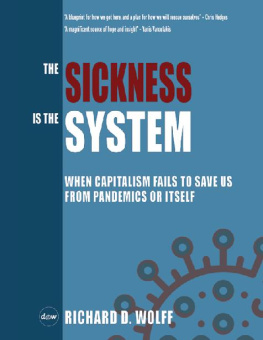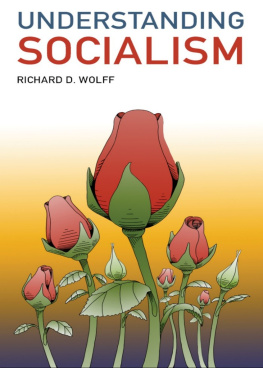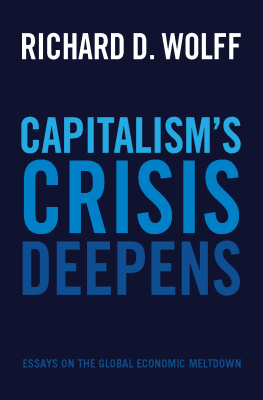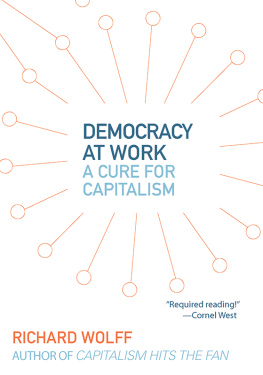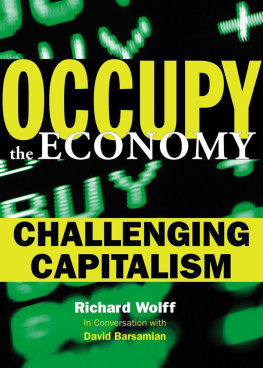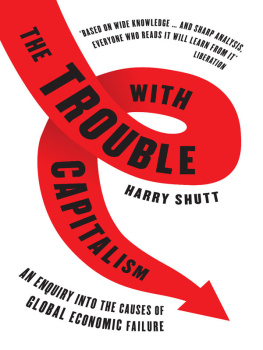Wolff Richard - Occupy the economy: challenging capitalism
Here you can read online Wolff Richard - Occupy the economy: challenging capitalism full text of the book (entire story) in english for free. Download pdf and epub, get meaning, cover and reviews about this ebook. City: United States, United States, year: 2012, publisher: City Lights Publishers, genre: Politics. Description of the work, (preface) as well as reviews are available. Best literature library LitArk.com created for fans of good reading and offers a wide selection of genres:
Romance novel
Science fiction
Adventure
Detective
Science
History
Home and family
Prose
Art
Politics
Computer
Non-fiction
Religion
Business
Children
Humor
Choose a favorite category and find really read worthwhile books. Enjoy immersion in the world of imagination, feel the emotions of the characters or learn something new for yourself, make an fascinating discovery.

- Book:Occupy the economy: challenging capitalism
- Author:
- Publisher:City Lights Publishers
- Genre:
- Year:2012
- City:United States, United States
- Rating:3 / 5
- Favourites:Add to favourites
- Your mark:
- 60
- 1
- 2
- 3
- 4
- 5
Occupy the economy: challenging capitalism: summary, description and annotation
We offer to read an annotation, description, summary or preface (depends on what the author of the book "Occupy the economy: challenging capitalism" wrote himself). If you haven't found the necessary information about the book — write in the comments, we will try to find it.
Abstract: A hot-button primer on the taboo subject impacting most Americans today: the failure of capitalism to deliver public good. Read more...
Occupy the economy: challenging capitalism — read online for free the complete book (whole text) full work
Below is the text of the book, divided by pages. System saving the place of the last page read, allows you to conveniently read the book "Occupy the economy: challenging capitalism" online for free, without having to search again every time where you left off. Put a bookmark, and you can go to the page where you finished reading at any time.
Font size:
Interval:
Bookmark:
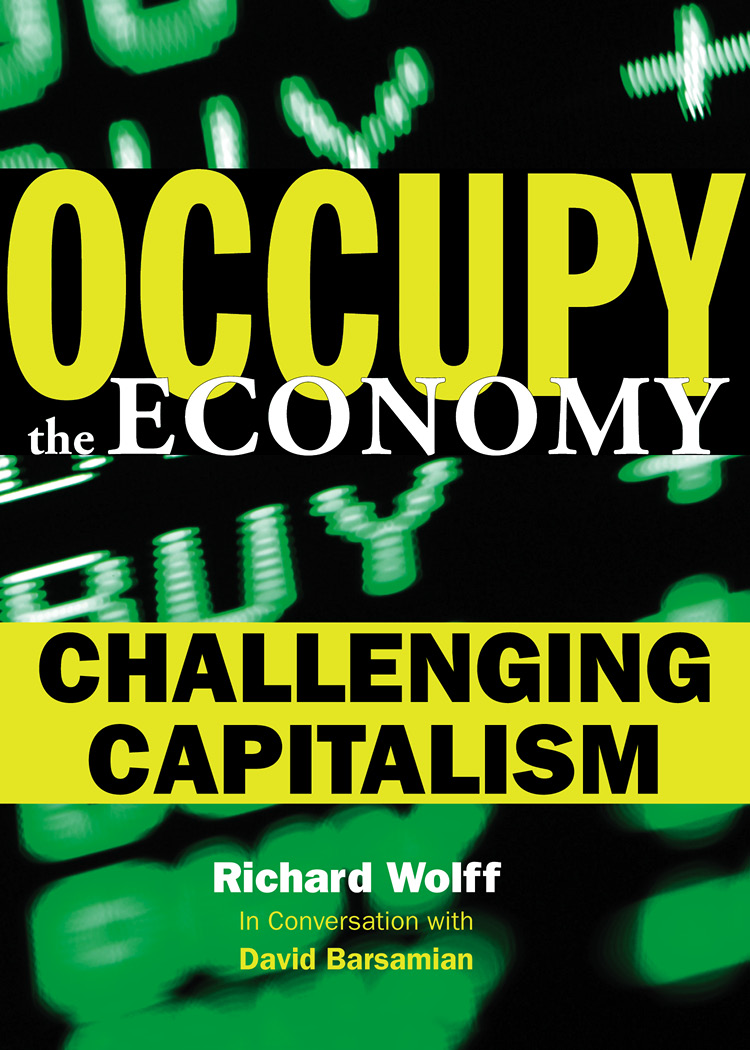
Copyright 2012 by Richard Wolff
Copyright 2012 by David Barsamian
All Rights Reserved
The Open Media Series is edited by Greg Ruggiero and archived by
the Tamiment Library, New York University.
eISBN 978-0-87286-568-6 (ebook)
Library of Congress Cataloging-in-Publication Data
Wolff, Richard.
Occupy the economy : challenging capitalism / by Richard Wolff ; interviews with David Barsamian.
p. cm. (Open media series)
ISBN 978-0-87286-567-9 (paper)
1. United StatesEconomic conditions2009- 2. United StatesEconomic policy2009- 3. CapitalismUnited States. 4. Income distributionUnited States. 5. Occupy movement. I. Barsamian, David. II. Title.
HC106.84.W65 2012
339.20973dc23
2012006793
City Lights Books are published at the City Lights Bookstore,
261 Columbus Avenue, San Francisco, CA 94133.
www.citylights.com
Occupy the Economy
challenging capitalism
Richard Wolff
Interviews with David Barsamian

Open Media Series
City Lights Books
For the last half-century, capitalism has been a taboo subject in the United States. Among politicians, journalists, and academicsand in public conversation generallythe word has been avoided or else exclusively praised in over-the-top prose. Professional economists have used words like perfect competition and optimal allocation of resources and efficiency to teach their students and assure one another how absolutely wonderful capitalism was for everyone. Politicians repeated, robot-style, that the U.S. is the greatest country in the world and that capitalism is the greatest economic system in the world. Those few who have dared to raise questions or criticisms about capitalism have been either ignored or told to go live in North Korea, China or Cuba as if that were the only alternative to pro-capitalism cheerleading.
Americans have criticized and debated their educational, medical, welfare, transportation, mass media, political, and many other institutions and systems. They have questioned and at least partly transformed such traditional institutions as racism, sexism, the heterosexual family and the state. They have even sometimes challenged this or that aspect of the economy such as prices, Federal Reserve actions, and so on, but almost never the particular economic system.
Questioning and criticizing capitalism have been taboo, treated by federal authorities, immigration officials, police and most of the public alike as akin to treason. Fear-driven silence has substituted for the necessary, healthy criticism without which all institutions, systems, and traditions harden into dogmas, deteriorate into social rigidities, or worse. Protected from criticism and debate, capitalism in the United States could and has indulged all its darker impulses and tendencies. No public exposure, criticism and movement for change could arise or stand in its way as the system and its effects became ever more unequal, unjust, inefficient and oppressive. Long before the Occupy movement arose to reveal and oppose what U.S. capitalism had become, that capitalism had divided the 1 percent from the 99 percent.
The importance of the Occupy movement was and is positioning its challenge to capitalism front and center among its concerns and passions. No oppositional mass movement of the last fifty yearsone drawing broadly inclusive participationhas been similarly daring in going beyond single-issue focus to make economic injustice for the 99 percent and the ruling economic system central, defining issues. Despite the power of pro-capitalism ideology, Occupy has been able to contest it in amazingly profound ways in an amazingly short time and for an amazing number of Americans.
Of course Occupy is a first step. Nothing of comparably broad scope and with such transformative social objectives has ever moved forward in a straight line. Its rather two steps forward, one step backward. However a major barrier has been broken, a major line crossed, and a new stage of U.S. politics has begun. The issue of our economic system and whether it is adequate to our needs as a people has now been returned to the center of national discussion, criticism, and debate.
The political, mass media, and academic establishments react predictably. They can not acknowledge the historic significance of what Occupy says and does; that would require admitting the need to debate precisely those issues they had effectively banned from acceptable public discourse. So the politicians repress. New Yorks Mayor Bloomberg claimed that he forcibly removed Occupy from Zuccotti Park for reasons of cleanliness. Bloomberg, it should be remembered, has presided for many years over one of the filthiest subway systems in the industrial world, one of the dirtiest public garbage systems, and a snow removal system that inspires only our leading comics. The mass media did their usual bit: ignoring Occupy as long as possible, massively misreporting when Occupy was hot news, largely cheering or glossing the removal of Occupy encampments, and then resuming the basic practice of ignoring the ongoing developments of Occupy and related events and activities.
The academic economics profession ought to have been most intimately involved in analyzing and debating a broken capitalist system whose deep crisis had confounded all its confident expectations. It has done nothing of the sort. Instead it proceeds as ifand indeed mostly still insists that nothing has happened to disturb its fifty-year celebration of capitalisms efficiency and growth. A few professors of economics (e.g., Paul Krugman) and business (e.g., Nouriel Roubini) have commented on the absurdity of that insistence. But most of them could get no further than to recycle Keynes 1930s critiques of a depressed capitalism and his recommendations for deficit spending and monetary stimuli by the government. And, of course, the few right-wing economists who have taken the crisis seriously, utilized it to push yet again for less government economic intervention as the panacea.
Questioning the system and debating basic system change has remainedfor government, mainstream media and most professorssomething beyond the pale. They see no need to end their 50-year repression or marginalization of such questions and debates. For them, the basic organizations of production and distribution of commodities, like the property and power structures that sustain them, do not deserve criticism. Yet the pressure and mass constituency for a real challenge to that repression had been building across the crisis and emerged with public power in the Occupy movement in late 2011.
The interviews gathered in this book further contest that repression and further develop that challenge. As a broad array of questions are raised and discussed, one theme becomes ever clearer. The failure of government regulation, the growing inequalities of income and wealth, the roll-back on New Deal reforms, the parallel impositions of mass austerity programs by European and U.S. governments: these and many more aspects of the crisis that hit in 2007 are shown to result from how the capitalist system works and not only from this or that particular historical event or economic actor.
Across the pages that follow, what emerges is the central importance of how capitalism very particularly organizes production: masses of working people generate corporate profits that others take and use. Tiny boards of directors, selected by and responsible to tiny groups of major shareholders, gather and control corporate profits, thereby shaping and dominating society. That tiny minority (boards and major shareholders) of those associated with and dependent upon corporations make all the basic decisionshow, what, and where to produce and what to do with the profits. The vast majority of workers within and residents surrounding those capitalist corporations must live with the results of corporate decisions. Yet they are systematically excluded from participating in making those decisions. Nothing more glaringly contradicts democracy than how capitalism organizes the corporate enterprises where working people produce the goods and services without which modern life for everyone would be impossible.
Font size:
Interval:
Bookmark:
Similar books «Occupy the economy: challenging capitalism»
Look at similar books to Occupy the economy: challenging capitalism. We have selected literature similar in name and meaning in the hope of providing readers with more options to find new, interesting, not yet read works.
Discussion, reviews of the book Occupy the economy: challenging capitalism and just readers' own opinions. Leave your comments, write what you think about the work, its meaning or the main characters. Specify what exactly you liked and what you didn't like, and why you think so.

